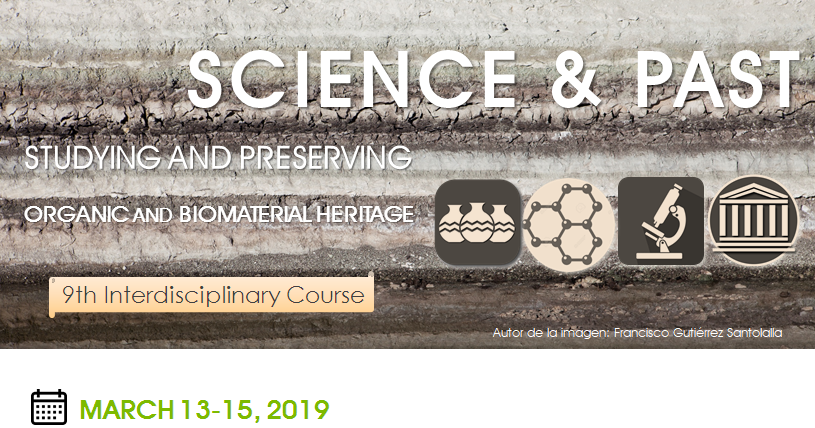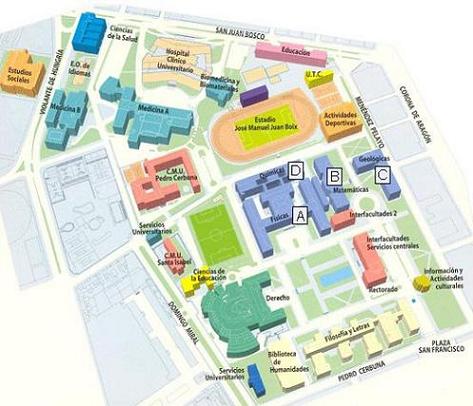
The course is focused on the development and use of scientific techniques in order to extract archaeological, historical and conservation information from organic and biomaterials belonging to our cultural heritage. In this edition, special focus will be given on understand and preserve these type of materials through an in-depth scientific approach.
The lectures are addressing to students, researchers and professionals in chemistry, physics, biology, paleontology, archaeology, conservation science, etc., to acquire a solid knowledge on the state of art of this topic, applied to the study, safeguarding, conservation and authentication of material heritage.
PROGRAM
Wednesday, 13th March
- From bones and clay to human behaviour. Contributions from the Sima de los Huesos (Atapuerca)
- Ancient DNA: from ultrashort molecules to individuals, populations, species and ecosystems.
- Molecular and computational methods in ancient DNA research .
Thursday, 14th March
- Archaeological chemistry: Detecting Molecules to identify ancient materials.
- Characterisation of archaeological waterlogged wood by pyrolysis and mass spectrometric techniques: Part 1.
- Characterisation of archaeological waterlogged wood by pyrolysis and mass spectrometric techniques: Part 2.
Friday, 15th March
- Characterisation of Asian lacquers: a focus on analytical pyrolysis.
- The analysis of natural dyes in a museum context.
- Discussion and concluding remarks
Course coordinator:
Dr. Josefina Pérez-Arantegui (Instituto de Investigación en Ciencias Ambientales-Universidad de Zaragoza)
Confirmed speakers:
– Prof. Maria Perla Colombini – Università di Pisa, Italy
– Dr Jeannette Lucejko – Università di Pisa, Italy
– Prof. Ludovic Orlando, PhD – CNRS – Université de Toulouse III, France – Natural History Museum of Denmark, University of Copenhagen, Denmark
– Dr. Nohemí Sala – Centro de Investigación sobre la Evolución Humana, CENIEH, Spain
– Dr. Diego Tamburini – Dep. Scientific Research, The British Museum, United Kingdom
REGISTRATION
Please use this on-line registration form ![]()
REGISTRATION FEES:
| Registration period | Date | Senior Registration Fee | Student Registration Fee |
|---|---|---|---|
| Early registration | until February 27, 2019 | 150 € | 80 € |
| Late registration | from February 28, 2019 | 200 € | 100 € |
SPECIAL FEES FOR STUDENTS OF THE UNIVERSITY OF ZARAGOZA: 20€
REGISTRATION FEES INCLUDES
– Attendance to course sessions
– Program and course documentation
– Certificate of attendance
– Coffee Breaks
PAYMENT
Payment (in euro) should be made by bank transfer to:
Bank: Ibercaja
IBAN: ES 82 2085 0111 79 0330788546
Swift code: CAZRES2Z
Please, include clearly your name in the bank transfer voucher
CONFIRMATION OF REGISTRATION
Your registration will be confirmed when the payment of the registration fee is received by the organizers (please, send copy of the bank transfer to iuca@unizar.es). Written confirmation will be sent by e-mail
FINANCIAL SUPPORT
Financial support will be given for a limited number of participants to cover travel expenses in full or partly. Applicants should send a letter to the organizing committee explaining the reasons for applying financial support and listing the possible expenses, together with his/her curriculum vitae and a supporting letter by his/her supervisor.
The information should be sent by email (iuca@unizar.es) before February 20th, 2019
KEY DATES
Early registration deadline: February 27th, 2019
Application deadline for financial support: February 20th, 2019
VENUE
Salón Actos Edificio Matemáticas (Facultad de Ciencias)
Campus San Francisco. University of Zaragoza.Zaragoza. Spain

More info: iuca@unizar.es
THE NUMBER OF PARTICIPANTS IS LIMITED (ACCORDING TO REGISTRATION ORDER)


 PROGRAM (Download)
PROGRAM (Download)